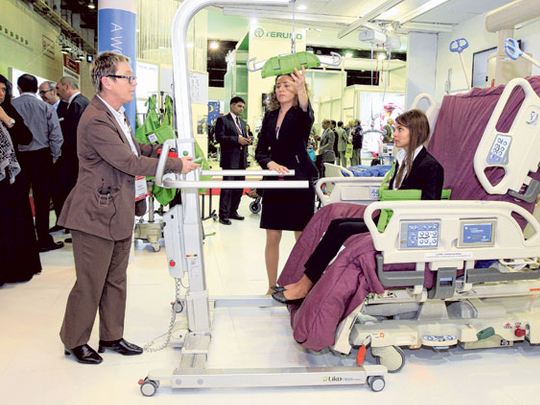
Dubai: The medical tourism initiative received a much-needed boost as government bodies, stakeholders, private healthcare representatives and global healthcare companies met under the same roof of Arab Health, which opened on January 28.
According to healthcare officials, who spoke about the medical tourism initiative and its implementation, the sector generated $1.6 billion (Dh5.8 billion) for Dubai in 2012.
The figure for medical tourism is expected to increase this year.
Officials said there were several drivers for growth. World-class healthcare, niche specialities and Dubai’s reputation as a politically stable, modern and developed city in addition to the emirate’s regulatory environment, capacity planning and encouragement of Public Private Partnerships (PPP) all played a role.
The initiative was announced in 2012 by Shaikh Hamdan Bin Mohammad Bin Rashid Al Maktoum, Crown Prince of Dubai and Chairman of the Dubai Executive Council. Since then, several measures have been taken to unify medical tourism procedures in collaboration with the Dubai Health Authority (DHA), General Directorate for Residency and Foreigners Affairs (GDRFA) and the Department of Tourism and Commercial Marketing (DTCM), among others.
Last month the DHA and GDRFA signed a memorandum of understanding (MoU) on medical tourism visas. The MoU will help overseas patients who wish to have treatment in Dubai take advantage of a three-month medical tourist visa, extendible twice, up to nine consecutive months.
The medical tourism initiative will be implemented by hosting medical exhibitions, participating in overseas exhibitions, encouraging global healthcare providers to set up businesses and increasing government and private investment in healthcare, said Eisa Al Maidour, Director-General of the Dubai Health Authority (DHA).
He told Gulf News that the DHA had completed a comprehensive capacity survey of public and private healthcare facilities in Dubai under the Dubai Clinical Services Capacity Plan (DCSCP) 2020.
He explained that the gathered information will provide investors with the necessary data for investment. Further, the DCSCP will point out the specialities and sub-specialities where investment is needed.
Al Maidour said: “The data will definitely make Dubai’s healthcare environment attractive for investors. Dubai is a one-stop shop for a medical tourist with its medical and other facilities.”
According to Marwan Abedin, Chief Executive Officer, Dubai Healthcare City (DHCC), the free zone healthcare provider is positioned to become a hub for medical tourists.
Dubai Healthcare City (DHCC) which was launched in 2002 has more than 3,700 licensed healthcare professionals, 120 internationally acclaimed medical centres, and 90 specialities. Abedin told Gulf News that over the last three years DHCC has witnessed growth in medical tourism with 15 per cent of its patients categorised as medical tourists.
He said: “Medical tourism is one of our key focus areas. The DHCC along with its stakeholders has identified the pieces of the puzzle that will help formulate the medical tourism strategy from healthcare regulations to service industry partnerships and logistics. We are also looking at collaborating with tourism authorities abroad.”
To further the initiative, the DHCC has introduced a comprehensive guide, Patients Beyond Borders: Dubai Healthcare City Edition, as a resource for medical travel in Dubai.
Dr Carlos Nunez, Chief Medical Officer at CareFusion, manufacturer of products and services that reduce medication errors and hospital-acquired infections, told Gulf News that increasing the standards of medical care is a commendable effort by the authorities.
He said: “It will have a positive impact on medical tourism. The reason people go to a different country for treatment is for better quality, safety and affordable cost.”
Dubai attracts medical visitors from countries such as Libya, Iraq, Iran, Nigeria, Tunisia, India, Pakistan, Russia and those from the GCC, among others.












